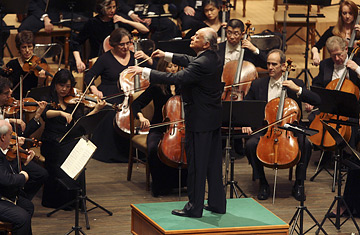
New York Philharmonic Music Director Lorin Maazel directs the orchestra during a performance in Pyongyang, North Korea on February 26, 2008.
To prolonged applause, New York Philharmonic music director Lorin Maazel took to a podium in Pyongyang. And as he stood in front of a standing room only audience of about 1,400 people, it became clear quickly that the evening would be one of rare power and emotion. North Korean and U.S. flags stood at either end of the stage, and the entire audience rose as both nations' anthems were played. From that point on, for the next two hours, it was hard to remember that during the bus ride that afternoon, the members of the orchestra and the journalists accompanying them had passed a poster of a giant fist slamming a helpless little Uncle Sam that read, "Smash the USA."
When Maazel introduced George Gershwin's "An American in Paris" to the audience, he told them that perhaps one day another composer would write a famous symphony entitled "An American in Pyongyang." Whatever ambivalence the North Korean audience may have felt until then evaporated. The crowd laughed — and applauded long and hard. "From that point on," Maazel would later say, "you could just feel the warmth in the room." For the Korean audience, however, the most powerful piece was the one the orchestra played last: Arirang, a traditional Korean folk anthem loved in both North and South.
As the orchestra began to leave the stage, several members turned and waved goodbye, and many in the audience reciprocated. Bassist Jon Deak later said he was near tears. So too was a young Korean-American violinist Michelle Kim, a descendant of a North Korean family who lived in Seoul until she was 11. "Tonight I didn't feel South Korean or North Korean but Korean," she said. "It was very emotional."
U.S. diplomats, current and former, were euphoric. Donald Gregg, a former State Department and CIA official, who diplomats say has played a quiet but influential role in getting the Bush Administration to engage with North Korea, said he "has rarely seen North Korean officials seem more friendly and flexible." Former U.S. Defense Secretary William Perry, attending as a guest of the orchestra, said he thought the evening "may have pushed us over the top" when it comes to the continually difficult six-party talks about the North's nuclear weapons program.
The diplomatic consensus was not good going into the orchestra's adventure in the Hermit Kingdom. Except for closing a nuclear reactor at Yongbyon — a significant step, to be sure — North Korean dictator Kim Jong Il has not fulfilled any other aspect of the supposedly ground-breaking deal he signed last year. But the warmth and musical harmony of Tuesday night in Pyongyang seemed to belie that impasse. And what dramatic possibilities there might have been. Secretary of State Condoleezza Rice was on the same peninsula, albeit in South Korea, attending the inauguration of that country's new President. If there had been a breakthrough, Rice, a classically trained pianist, could easily have made a flight into the North Korean capital. That would have been some encore.
